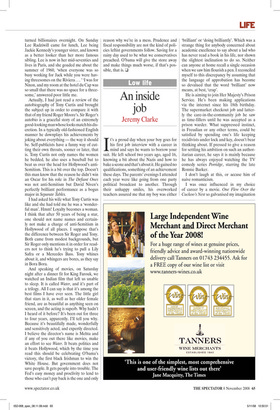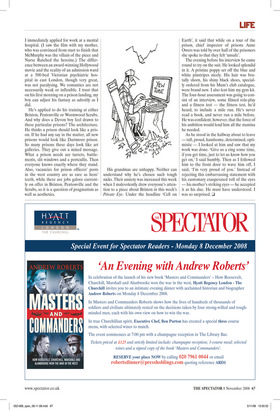An inside job
Jeremy Clarke
It’s a proud day when your boy goes for his first job interview with a career in mind and says he wants to borrow your suit. He left school two years ago, aged 16, knowing a bit about the Nazis and how to bake a scone and that’s about it. He gained no qualifications, something of an achievement these days. The parents’ evenings I attended each year were like going from one party
L 008CTA A 30/09/8
political broadcast to another. Through their unhappy smiles, his overworked teachers assured me that my boy was either ‘brilliant’ or ‘doing brilliantly’. Which was a strange thing for anybody concerned about academic excellence to say about a lad who has never read a book in his life, nor shown the slightest inclination to do so. Neither can anyone at home recall a single occasion when we saw him flourish a pen. I reconciled myself to this discrepancy by assuming that the language of approbation has become so devalued that the word ‘brilliant’ now means, at best, ‘crap’.
He is aiming to join Her Majesty’s Prison Service. He’s been making applications via the internet since his 18th birthday. The supermarket checkout job and latterly the care-in-the-community job he saw as time-fillers until he was accepted as a prison warder. What suppressed instinct, in Freudian or any other terms, could be satisfied by spending one’s life keeping recidivists under lock and key, doesn’t bear thinking about. If pressed to give a reason for settling his ambition on such an authoritarian career, he says it is mainly because he has always enjoyed watching the TV comedy series Porridge, starring the late Ronnie Barker.
I don’t laugh at this, or accuse him of naive romanticism.
1 age 4
I was once influenced in my choice of career by a movie. One Flew Over the Cuckoo’s Nest so galvanised my imagination I immediately applied for work at a mental hospital. (I saw the film with my mother, who was convinced from start to finish that McMurphy was the villain of the piece and Nurse Ratched the heroine.) The difference between an award-winning Hollywood movie and the reality of an admission ward at a 500-bed Victorian psychiatric hospital in east London, though very great, was not paralysing. We romantics are not necessarily weak or inflexible. I trust that on his first morning on a prison landing, my boy can adjust his fantasy as adroitly as I did.
He’s applied to do his training at either Brixton, Pentonville or Wormwood Scrubs. And why does a Devon boy feel drawn to these particular prisons? The architecture. He thinks a prison should look like a prison. If he had any say in the matter, all new prisons would look like Dartmoor prison. So many prisons these days look like art galleries. They give out a mixed message. What a prison needs are turrets, battlements, slit windows and a portcullis. Then everyone knows exactly where they stand. Also, vacancies for prison officers’ posts in the west country are as rare as hens’ teeth, while there are jobs galore currently on offer in Brixton, Pentonville and the Scrubs, so it is a question of pragmatism as well as aesthetics. His grandmas are unhappy. Neither can understand why he’s chosen such tough nicks. Their anxiety was increased this week when I malevolently drew everyone’s attention to a piece about Brixton in this week’s Private Eye. Under the headline ‘Cell on Earth’, it said that while on a tour of the prison, chief inspector of prisons Anne Owers was told by over half of the prisoners she spoke to that they felt ‘unsafe’.
The evening before his interview he came round to try on the suit. He looked splendid in it. A pristine poppy set off the blue and white pinstripes nicely. His hair was brutally shorn, his shiny black shoes, specially ordered from his Mum’s club catalogue, were brand new. I also lent him my gym kit. The four-hour assessment was going to consist of an interview, some filmed role-play and a fitness test — the fitness test, he’d heard, to include a mile run. He’s never read a book, and never run a mile before. He was confident, however, that the force of his ambition would lend him all the stamina he needed.
As he stood in the hallway about to leave — tall, proud, handsome, determined, optimistic — I looked at him and saw that my work was done. ‘Give us a ring some time, if you get time, just to let us know how you get on,’ I said humbly. Then as I followed him to the front door to wave him off, I said, ‘I’m very proud of you.’ Instead of rejecting this embarrassing statement with his customary exasperated roll of the eyes — his mother’s striking eyes — he accepted it as his due. He must have understood. I was so surprised. ❑



















































































 Previous page
Previous page